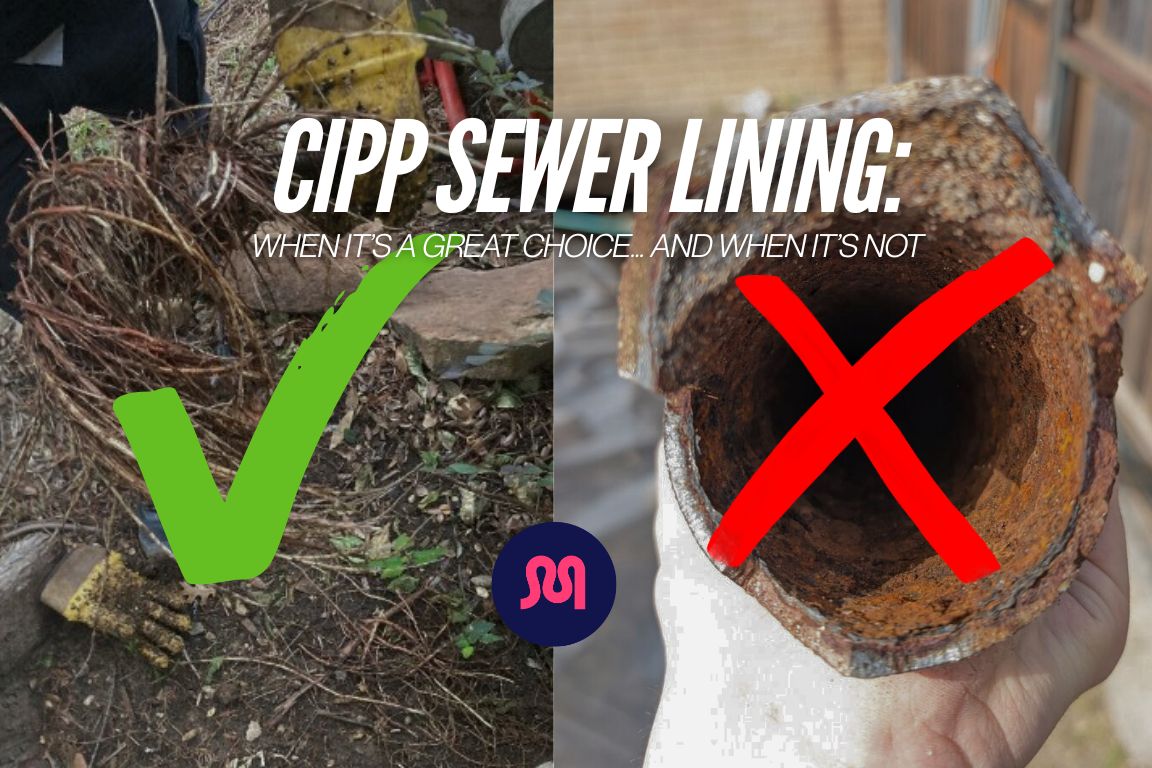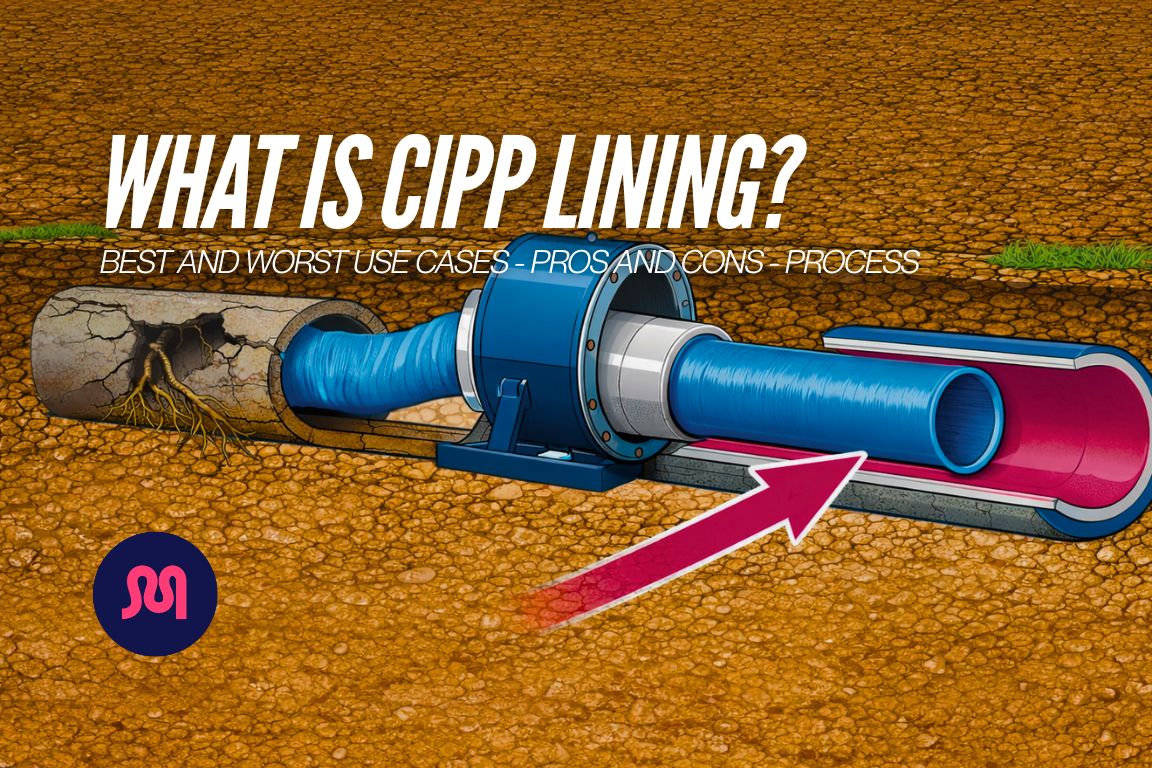Comparing Partial vs Full Sewer Line Replacement

table of contents
table of contents
Your sewer line suffered a major blow: multiple sewer bellies, pipe separations, or a complete collapse of your sewer main. Time is of the essence, and you need to decide whether partial or complete sewer line replacement is the best long-term solution for your home plumbing.
The answer comes down to one number: are you replacing over or under 50 feet of pipe?
We train our plumbers to identify the exact cause of your sewer issue, compare your repair options, and establish the single best solution to the problem. This is the advice we give our customers — and we wrote it up in a homeowner’s guide for you.
We’re Mother — a Dallas based plumbing company founded on modern service options and long-term solutions. Our research team and Master Plumbers built this comparison guide for homeowners to compare their sewer repair options and choose the best quote for their project.
Live in Dallas and need a second opinion? Call us 7 days a week for expert, timely service.
{{sewer-line-repair-and-replacement="/services/sewer-line-repair-and-replacement"}}
The 6 Sewer Line Problems Driving Your Repair Decision

If you’re choosing between partial sewer pipe replacement or full sewer line replacement, then you’re dealing with these 6 common sewer repair issues:
- Multiple underground sewer pipe leaks
- Multiple tree root intrusions
- Break in your sewer branch line
- Separation in your sewer line
- Sewer belly
- Sewer line collapse
These sewer line repair options are meant for damaged pipe sections of a significant length — 10 feet or more.
These 2 sewer repair solutions are generally unnecessary for single cracks, leaks or intrusions — these are best handled by spot repairs.
Need a different solution? Compare your choices in our comprehensive guide to Dallas sewer repair options.
{{best-dallas-sewer-repair-options="/blogs/best-dallas-sewer-repair-options"}}
When to Choose a Partial vs Full Sewer Line Replacement
First a quick overview of each kind of repair:
Partial sewer line replacement involves digging up and replacing a longer, compromised section of your sewer pipe. Damaged pipe sections typically extend from 10 to 50 feet.
Full sewer line replacement means we're replacing the entire length of your sewer pipe, from under your home's foundation all the way to the municipal connection or your septic tank.
Side-by-Side Comparison Table: Partial Replacement vs. Full Replacement
*Note: Costs are estimates and can vary widely based on pipe depth, location (e.g., under concrete), soil conditions, and specific DFW market factors.
Partial Sewer Line Replacements: 10-50 Feet of Pipe Damage

Partial replacement is used when a "patch" isn't enough, but the entire line doesn't need to be replaced. They are best utilized for damaged pipe sections between 10-50 feet in length.
What’s involved in the repair process: After diagnosing the extent of the damage with a camera, we excavate a trench along the length of the damaged section of pipe.
The old, faulty pipe is completely removed, and a brand new, durable Schedule 40 PVC pipe section is laid in its place. We carefully ensuring proper slope for drainage. Connections are made to the existing healthy pipe on both ends, and the trench is then backfilled.
- Pros:
- Replaces a significant section of bad pipe, offering a more robust solution than a spot repair for longer areas.
- Corrects issues like bellies (sags) or multiple extensive tree root intrusions.
- Less expensive and disruptive than a complete sewer line replacement.
- Cons:
- Costs become excessive in inaccessible areas (under foundation).
- Invasive digging may cut through established landscaping or driveway areas.
- Still leaves older pipe sections in place, which could develop issues later.
Full Sewer Line Replacement: 50+ Feet of Damaged Pipes

Complete sewer line replacement is typically done when the entire line is extensively damaged or has reached the end of its lifespan.
As a general rule of thumb, replacing your entire sewer line is the best course of action when 50+ feet of your pipe is damaged.
What’s involved in the repair process: First, our plumbers conduct extensive excavation along the entire sewer line path. Extreme care is taken to reduce damage to existing landscaping, driveways and foundations. The entire existing pipe is disconnected and removed.
A new, complete sewer line is installed in the existing trench using new Schedule 40 PVC, offering a lifespan up to 100 years with regular maintenance. The new line is connected and rigorously tested for proper seals and joints.
Finally, complete backfilling occurs to restore your affected yard to its original state. This includes remediation of your landscaping and hardscape areas.
- Pros:
- Replaces the entire existing sewer line, providing a completely new Schedule 40 PVC sewer line.
- No existing pipe sections remain in place — this “resets the clock” on your sewer system’s lifespan.
- Full, restorative peace of mind, with a solution that resolves all existing sewer line repair issues.
- Cons:
- The most complex and expensive of all sewer repair options due to project scope and labor intensity.
- Invasive digging will likely affect landscaping and hardscape areas, and may require work in and around your foundation.
When to Choose Partial Sewer Line Replacement
Partial sewer line replacement is the better choice when the damage is more extensive than a single point, but still doesn't warrant replacing the entire pipe.
Real-life customer scenarios where partial sewer line replacement is the better choice:
- A long section of pipe with multiple hairline cracks or root intrusions: The camera showed 15-20 feet of pipe that was consistently compromised, making a single spot repair impractical.
- A significant belly (sag) in a sewer pipe section: A sewer belly caused standing water and repeated clogs in a Dallas home and its backyard. This required excavating and re-laying that entire section to ensure proper slope.
- The pipe under a homeowner’s driveway was completely crushed or deteriorated: Replacing the entire segment made sense for this a high-traffic or critical area. There’s no cost benefit to making multiple penetrations or a large tunnel for multiple spot repairs.
When not to choose partial sewer line replacement: Don't choose partial replacement if your entire sewer line is old, constantly failing, or made of problematic materials like Orangeburg pipe.
In those cases, even replacing a large section is just a temporary fix, and a complete replacement offers a more cost-effective long-term solution.
When to Choose Full Sewer Line Replacement
Complete replacement of your sewer line is the best option when all other sewer repair options fail to address extensive issues or systemic failure — it’s time to “hit reset” on your sewer line.
Real-life customer scenarios where pipe rerouting is the better choice:
- A complete pipe collapse makes total replacement necessary: Our sewer camera inspection revealed a systemic collapse over 50 feet in length, making partial sewer line replacement ineffective.
- The existing pipe materials are outdated and have failed: We noted extensive corrosion, multiple penetrations and 2 separations throughout an existing cast iron sewer pipe.
When not to choose full replacement: If you don’t have to replace your entire main sewer line, consider partial replacement instead. Be advised that you’ll retain some older pipe sections if you do — but you’ll save thousands in project costs.
If your collapsed sewer line travels underneath your home’s foundation, ask your plumber about pipe rerouting options. It may be a safer long-term option for your home’s structure to lay a new pipe around your foundation instead of digging through or under it.
What’s your project going to cost? Get current answers on local pricing in our updated Dallas sewer line repair and replacement cost guide.
{{main-sewage-line-replacement-best-texas-guide="/blogs/main-sewage-line-replacement-best-texas-guide"}}
✅ Mother Modern Plumbing’s Recommendation

Ultimately, choosing between partial sewer replacement and full sewer line replacement comes down to one number: 50 feet.
Choose partial sewer line replacement when there are multiple leaks, cracks or systemic issues in a pipe section between 10-50 feet in length.
Choose pipe rerouting when your entire sewer line is compromised by a collapse or multiple complex penetrations, or when your damaged pipe section is over 50 feet long.
TABLE: Partial vs Full Sewer Line Replacement Use Cases
📞 Call Mother for Dallas Sewer Line Repair and Replacement
Still not sure which repair is right for your Dallas home? Worried your current plumbing quotes are too high, too invasive or incomplete?
Call Mother for a thorough inspection of your Dallas sewer line. We’ll identify the problem with our non-invasive sewer camera inspection and hydrostatic testing services. Then, we’ll walk you through the pros and cons of each service option in simple terms, with no pressure.
Whether you need simple spot repairs, a partial sewer line replacement, or a complete replacement of your main sewer line, trust our plumbing experts for an honest second opinion and a long-term solution for your home.
{{sewer-line-repair-and-replacement="/services/sewer-line-repair-and-replacement"}}
Common Q’s about Drainage Service
Is sewer line replacement covered by insurance?
Homeowner's insurance typically doesn't cover general wear and tear or maintenance issues. However, if the damage was caused by a sudden, accidental event (like a vehicle crushing the pipe, or a specific tree falling on it), there might be some coverage. It's always best to check with your specific insurance provider.
How long will my new sewer pipe section last?
We install new sections of Schedule 40 PVC pipe for spot repairs and partial sewer line replacements. Schedule 40 PVC is designed to last up to 100 years.
The lifespan of the entire system will depend on the remaining old pipe, which could still develop problems.
How long does partial sewer line replacement take?
Partial sewer line replacement takes 3-7 days, depending on the length of your damaged pipe section and how deep it’s buried in your yard.
How long does full sewer line replacement take?
Full sewer line replacement takes 5-8 days, depending on the length of your damaged pipe section, how deep it’s buried in your yard, and if it travels near your home’s foundation.
What pipe material is best for sewer line replacement?
Your plumber should use Schedule 40 PVC for all sewer line replacement projects. Schedule 40 PVC offers stronger durability, chemical resistance, and anti-corrosive properties than other sewer pipe materials.




